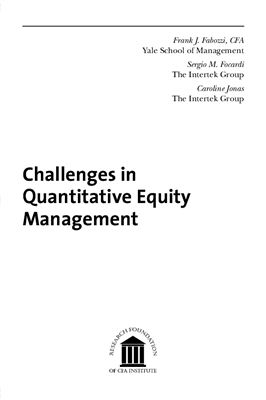Research Foundation of CFA Institute, 2008.
ISBN 978-1-934667-21-7.
The objective of this book is to explore a number of questions related to active quantitative equity portfolio management—namely, the following:
1. Is quantitative equity investment management likely to increase in importance in the future? Underlying this question is the need to define what is meant by a quantitative investment management process.
2. Alteatively, because quantitative processes are being increasingly adopted by traditional managers, will we see a movement toward a hybrid management style that combines the advantages of judgmental and quantitative inputs? Or will differentiation between traditional judgmental and quantitative, model driven processes continue, with the model-driven processes moving toward full automation?
3. How are model-driven investment strategies affecting market efficiency, price processes, and performance? Is the diffusion of model-based strategies responsible for performance decay? Will the effects eventually have an impact on the ability of all management processes, traditional as well as quantitative, to generate excess retus?
4. How are models performing in today’s markets? Do we need to redefine performance? What strategies are quantitative managers likely to implement to improve performance?
5. Given the recent poor performance of many quantitative strategies, is investor demand for the strategies expected to hold up? If quants as a group cannot outperform traditional managers, what is their future in the industry?
ISBN 978-1-934667-21-7.
The objective of this book is to explore a number of questions related to active quantitative equity portfolio management—namely, the following:
1. Is quantitative equity investment management likely to increase in importance in the future? Underlying this question is the need to define what is meant by a quantitative investment management process.
2. Alteatively, because quantitative processes are being increasingly adopted by traditional managers, will we see a movement toward a hybrid management style that combines the advantages of judgmental and quantitative inputs? Or will differentiation between traditional judgmental and quantitative, model driven processes continue, with the model-driven processes moving toward full automation?
3. How are model-driven investment strategies affecting market efficiency, price processes, and performance? Is the diffusion of model-based strategies responsible for performance decay? Will the effects eventually have an impact on the ability of all management processes, traditional as well as quantitative, to generate excess retus?
4. How are models performing in today’s markets? Do we need to redefine performance? What strategies are quantitative managers likely to implement to improve performance?
5. Given the recent poor performance of many quantitative strategies, is investor demand for the strategies expected to hold up? If quants as a group cannot outperform traditional managers, what is their future in the industry?

